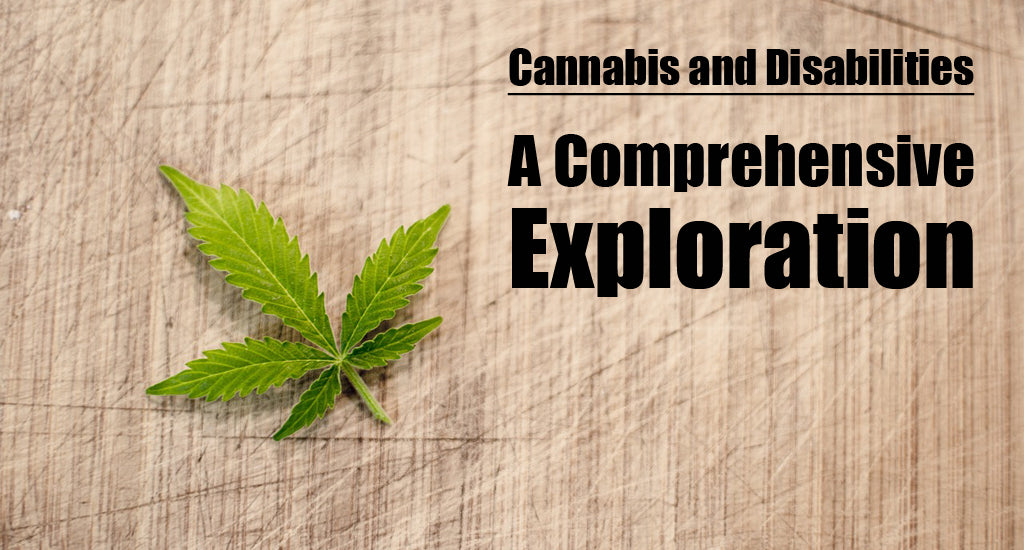
Cannabis and Disabilities: A Comprehensive Exploration
The debate surrounding the effectiveness of cannabis for persons with disabilities has gained considerable momentum in recent years. As attitudes towards cannabis continue to evolve, it's crucial to address the question: Is cannabis effective for persons with disabilities?
In this article, we will delve into the potential benefits of cannabis for individuals with disabilities and provide a concise breakdown of the ways it can offer relief and improve their quality of life.
Understanding Cannabis
Before we delve into the specifics of how cannabis can benefit individuals with disabilities, let's briefly revisit what cannabis is and how it interacts with the human body.
Cannabis, also known as marijuana or weed, is a plant that contains various compounds, the most prominent of which are THC (tetrahydrocannabinol) and CBD (cannabidiol). THC is the psychoactive component responsible for the "high" associated with marijuana, while CBD is non-psychoactive and is often linked to potential therapeutic effects. These compounds interact with the endocannabinoid system, a complex network of receptors in the body that helps regulate numerous physiological processes, including pain perception, inflammation, mood, and appetite.
Benefits of Cannabis for Persons with Disabilities
-
Pain Management: Cannabis has emerged as a potential solution for managing chronic pain, a widespread concern among Americans with disabilities. It holds the promise of offering relief from various sources of discomfort, including neuropathic pain, arthritis, and muscle spasms, potentially improving the daily lives of those dealing with these challenges.
-
Muscle Spasticity Reduction: Muscle stiffness can be really painful and make it tough to move, especially for people with certain disabilities. But there's hope: cannabis, especially a part called CBD, has shown it might help ease those muscle spasms and make the pain go away. This means it could be a game-changer, letting folks with disabilities move around more comfortably and with less pain.
-
Improved Sleep Patterns: Many folks with disabilities often struggle with sleep problems. But there's a potential solution: cannabis with lots of CBD. It seems like this can make a big difference in helping people sleep better by easing insomnia and making sure they get restful sleep. So, for those dealing with sleep issues due to disabilities, CBD-rich cannabis might offer some much-needed relief and a good night's sleep.
-
Emotional Well-being: A lot of people with disabilities face mood problems like feeling anxious or sad. But here's some hope: CBD, which comes from cannabis, has been looked at closely, and it seems like it might help with these feelings. That means it could provide some emotional support and help folks with disabilities feel more stable and better about their daily lives.
-
Appetite Stimulation: Some disabilities and the medicines that go with them can make you lose your appetite and lose weight. But here's something interesting: cannabis, especially types with more THC, could help you get your appetite back and stop losing weight. So, for people dealing with these issues, cannabis might be a way to keep a healthy appetite and maintain their weight.
-
Nausea and Vomiting Relief: Sometimes, because of disabilities or the medicines they need to take, people can feel really sick and even throw up. But here's something interesting: cannabis, especially types with a lot of THC, has been used to help with these problems. It can make the nausea and vomiting go away, which makes it easier for folks to take their important medicines and eat properly. It can be a big help for those dealing with these tough side effects.
-
Neuroprotection: Certain parts of cannabis, like CBD, seem like they could help protect the nervous system. For people with disabilities that affect their nerves, this could be a big deal. It might slow down how their conditions get worse, offering hope for a better quality of life and a chance to keep their health from declining too quickly. So, CBD from cannabis might be a real game-changer for folks with neurological disabilities.
-
Enhanced Quality of Life: Cannabis can make life better for people with disabilities. It helps with pain and discomfort, making everything feel easier. When you're not hurting all the time, you can enjoy life more and do things you love. So, cannabis can really boost the quality of life for folks dealing with disabilities, giving them a chance to live a happier, more comfortable life.
-
Seizure Management: People are really interested in CBD, especially when it comes to epilepsy and certain brain-related disabilities. It looks like CBD might help make seizures happen less often and be less severe. This is a big deal for folks dealing with these conditions because fewer and milder seizures mean they can have a better, safer life. So, CBD is giving hope to people with epilepsy and certain brain issues.
-
Alternative to Conventional Medications: Cannabis can be like a different or extra way to help you feel better, without taking lots of regular medicines that might have side effects. It could mean you don't need to take as many pills or deal with their not-so-nice effects. So, for some people, cannabis can be a more natural and gentle option to help them stay healthy and feel good without all the extra medicines.
-
Stress Reduction: Handling a disability can be really tough on your emotions. But here's something to consider: cannabis might help you deal with stress and feeling anxious. It can make you feel calmer and happier, which can make a big difference in how you see things. So, for folks with disabilities, cannabis might be a way to feel better in their minds and have a more positive outlook on life.
Challenges and Considerations
While there are potential benefits, it's essential to acknowledge the challenges and considerations surrounding the use of cannabis for individuals with disabilities:
- Legal and Regulatory Issues: Cannabis laws vary widely by state in the United States, making access and legality a significant concern for many individuals with disabilities.
- Individual Response: Cannabis affects each person differently, and finding the right dosage and strain can be a trial-and-error process.
- Potential Side Effects: Cannabis use may lead to side effects such as dry mouth, dizziness, and cognitive impairment. It's crucial for individuals to be aware of these potential drawbacks.
- Interaction with Medications: Cannabis can interact with certain medications, so it's essential for individuals to consult with healthcare professionals before starting cannabis therapy.
- Lack of Scientific Consensus: While some research supports the use of cannabis for specific conditions, more rigorous studies are needed to establish a clear consensus on its effectiveness.
Conclusion
It is clear that cannabis holds promise as a potential source of relief and an avenue to improve the quality of life for many individuals with disabilities. Its various therapeutic properties, including pain management, muscle spasticity reduction, mood regulation, and more, make it a valuable consideration for those seeking alternative treatments.
Nonetheless, it is vital to approach cannabis use for medical purposes with caution and under the guidance of healthcare professionals. Legal and regulatory issues, individual responses, and potential side effects should all be carefully considered when exploring cannabis as a treatment option.
As research continues to expand in this area, a better understanding of the specific conditions and circumstances under which cannabis can be most beneficial for persons with disabilities will emerge. In the meantime, individuals should engage in open and informed discussions with their healthcare providers to determine whether cannabis is a suitable addition to their treatment plan.



